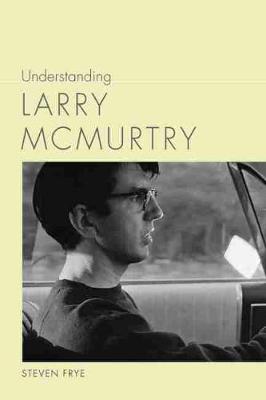Understanding Contemporary American Literature
2 total works
This is a roadmap to the dark and mythic topography of McCarthy's fiction. Named by Harold Bloom as one of the most significant American novelists of our time, Cormac McCarthy has been honored with the National Book Award and the National Book Critics Circle Award for "All the Pretty Horses", the James Tait Black Memorial Prize and the Pulitzer Prize for "The Road", and the coveted MacArthur Fellowship. Steven Frye offers a comprehensive treatment of McCarthy's fiction, assessing with the author's aesthetic and thematic concerns, his philosophical and religious influences, and his participation in Western literary traditions. Frye explores the early works of the Tennessee period in the context of the 'romance' genre, the southern gothic and grotesque, and the carnivalesque. A chapter is devoted to Blood Meridian, a novel that marks McCarthy's transition to the West and his full recognition as a major force in American letters.
In the final two chapters, Frye explores McCarthy's "Border Trilogy" and his later works - specifically "No Country for Old Men" and "The Road" - addressing the manner in which McCarthy's preoccupation with violence and human depravity exists alongside a perpetual search for meaning, purpose, and value.
In the final two chapters, Frye explores McCarthy's "Border Trilogy" and his later works - specifically "No Country for Old Men" and "The Road" - addressing the manner in which McCarthy's preoccupation with violence and human depravity exists alongside a perpetual search for meaning, purpose, and value.
Best known for his Pulitzer Prize-winning novel Lonesome Dove and his Academy Award-winning screenplay for Brokeback Mountain, Larry McMurtry is the author of twenty-nine novels, three memoirs, two collections of essays, and more than thirty screenplays. In Understanding Larry McMurtry, Steven Frye considers a broad range of McMurtry's most important novels and offers detailed textual analyses of works such as Horseman, Pass By, The Last Picture Show, Moving On, and Lonesome Dove to reveal the manner in which McMurtry engages the human condition.
Characters are at the heart of McMurtry's fiction, whether they are nineteenth- or twentieth-century ranchers, modern rodeo men, or women grappling with the angst and confusion of life in the suburbs of Houston. He has created characters rich in texture, such as Augustus McCrae and Woodrow Call, to encourage an understanding of the persistent force of American mythology, but also to transcend type so that they emerge as quintessentially human figures grappling with circumstances beyond their control.
McMurtry portrays with depth and insight the conundrums of the modern moment and its relation to heritage, and he deals as well with the intensities of the human mind as it negotiates with a complex and sometimes indifferent world. In Understanding Larry McMurtry, Frye offers a comprehensive treatment of one of the most important living authors, one who has emerged as a central figure in a rich and compelling contemporary canon.
Characters are at the heart of McMurtry's fiction, whether they are nineteenth- or twentieth-century ranchers, modern rodeo men, or women grappling with the angst and confusion of life in the suburbs of Houston. He has created characters rich in texture, such as Augustus McCrae and Woodrow Call, to encourage an understanding of the persistent force of American mythology, but also to transcend type so that they emerge as quintessentially human figures grappling with circumstances beyond their control.
McMurtry portrays with depth and insight the conundrums of the modern moment and its relation to heritage, and he deals as well with the intensities of the human mind as it negotiates with a complex and sometimes indifferent world. In Understanding Larry McMurtry, Frye offers a comprehensive treatment of one of the most important living authors, one who has emerged as a central figure in a rich and compelling contemporary canon.

